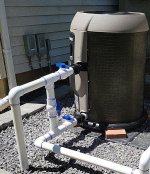I have a Hayward HeatPro Heat pump. I installed bypass valves per the manufacturer's direction. Duting the warm weather we had I did not run the heater and shut the valves off to bypass it. Should I have just left the valves open and have water run through the heater (with the heater off) or leave the bypass valves closed?
1. Would water harm the heater sitting in it while bypass valves are off?
2. Would water (with chemicals, ie. chlorine/shock, etc.) harm the heater if contiously flowing through the heater unnecessarily without the heater being used?
1. Would water harm the heater sitting in it while bypass valves are off?
2. Would water (with chemicals, ie. chlorine/shock, etc.) harm the heater if contiously flowing through the heater unnecessarily without the heater being used?


